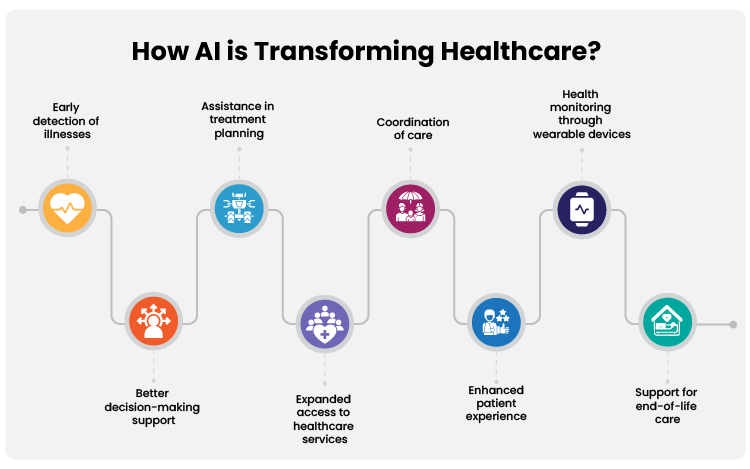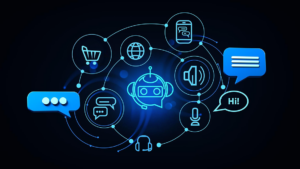

Balasubramanian
Artificial Intelligence in Healthcare: Saving Lives and Care
The world of healthcare is witnessing a groundbreaking transformation, with Artificial Intelligence (AI) leading the charge. From enhancing diagnostic precision to optimizing patient care, AI is becoming a vital tool in saving lives and improving the quality of care. This revolution is not just a technological shift but a profound opportunity to reimagine healthcare for the better.
Transforming healthcare with AI is no longer a distant vision, it is a life-saving reality. Imagine algorithms that detect cancer before symptoms appear, virtual assistants guiding patients through recovery, or robots performing surgeries with pinpoint precision. Artificial Intelligence is not just enhancing medicine; it is redefining it. As the demand for faster, more accurate, and personalized care grows, AI emerges as the driving force behind a healthcare revolution, setting new benchmarks for saving lives and improving well-being.
The Role of AI in Healthcare
Evolution of Artificial Intelligence: It leverages cutting-edge technologies like machine learning, natural language processing, and computer vision to address some of the most pressing challenges in medicine. These technologies enable computers to analyze vast amounts of medical data, identify patterns, and make predictions faster and more accurately than traditional methods.
Consider AI-powered diagnostic tools: They can detect diseases like cancer at an early stage, offering patients a better chance of recovery. In radiology, for instance, AI systems analyze scans to identify abnormalities that might escape the human eye. Beyond diagnostics, virtual health assistants are enhancing patient engagement by answering medical questions, reminding patients to take medications, and even scheduling appointments.
How AI is Saving Lives?
AI’s ability to save lives lies in its speed and precision. One remarkable example is its role in early diagnosis. For conditions like breast cancer, AI-driven algorithms can process mammograms with incredible accuracy, often detecting tumors at earlier stages than human experts.
In surgical settings, robots equipped with AI are assisting surgeons with minimally invasive procedures. These systems reduce the margin of error and enable precision at levels previously unimaginable. For instance, robotic surgery systems like the da Vinci Surgical System allow surgeons to perform complex operations with enhanced dexterity and control.

Enhancing Patient Care
Beyond saving lives, AI is redefining the way care is delivered to patients. Predictive analytics, for instance, allow healthcare providers to design personalized treatment plans based on an individual’s genetic makeup, lifestyle, and medical history. This level of customization improves outcomes and ensures patients receive care tailored specifically to their needs.
AI is also making strides in mental health. Virtual therapists and chatbots, like Woebot and Wysa, are providing accessible mental health support, offering coping strategies, and identifying when professional help might be necessary. These tools break barriers for individuals who might not otherwise seek traditional therapy.
Even hospital management benefits from AI. Predictive tools optimize scheduling, reduce patient wait times, and manage resources like ICU beds efficiently. These improvements translate to better patient experiences and smoother hospital operations.
The Future of AI in Healthcare
The future of AI in healthcare is brimming with possibilities. Genomics is one area poised for major breakthroughs, with AI helping to decode genetic information and predict inherited diseases. Wearable technologies, like smartwatches with health-monitoring capabilities, are becoming more advanced, allowing for real-time health tracking and early warnings for conditions like atrial fibrillation or sleep apnea.
Collaboration will be key to realizing this potential. AI developers, healthcare professionals, and policymakers must work together to address challenges, establish regulations, and ensure equitable access to these innovations.
Applications of AI in Healthcare
Artificial Intelligence is revolutionizing healthcare by driving innovation across multiple domains. From diagnosing complex conditions with high precision to personalizing treatments and optimizing hospital operations, AI is becoming indispensable. Its applications extend beyond clinical settings, empowering patients with tools for mental health support, wearable health monitoring, and virtual consultations. By addressing both patient-centric needs and operational challenges, AI is reshaping how care is delivered and experienced in today’s digital age.
Medical Imaging and Diagnostics: AI systems analyze medical images like X-rays, MRIs, and CT scans to detect diseases, such as cancer, fractures, or cardiovascular conditions, often with higher accuracy than human experts.
- Enhanced imaging analysis
- Early disease detection
Predictive Analytics: AI predicts patient outcomes, disease progression, or hospital readmission risks based on historical and real-time data.
- Risk assessment and patient outcomes
- Population health management
Personalized Medicine: AI helps tailor treatments based on a patient’s genetic profile, lifestyle, and medical history.
- Tailored treatment plans
- Genetic profiling
Drug Discovery and Development: Accelerates drug discovery by analyzing molecular structures, predicting drug efficacy, and identifying new therapeutic uses.
- Accelerated research processes
- Identification of potential drug candidates
Virtual Health Assistants: AI chatbots and voice assistants answer medical queries, provide health tips, schedule appointments, and monitor symptoms.
- Patient engagement and support
- Cost-effective consultation
Electronic Health Records (EHR): Artificial Intelligence is revolutionizing EHR by automating processes, improving data accuracy, and enhancing usability.
- Streamlined data management
- Enhanced interoperability
Wearable Health Devices (WHDs): AI-powered wearable health devices are revolutionizing personal health monitoring, empowering individuals to track their well-being and providing clinicians with real-time data for informed care decisions.
- Continuous health monitoring
- Real-time data collection
Robotic Surgery: AI-powered robotic devices, like the da Vinci Surgical System, provide greater precision, reduce errors, and enable minimally invasive procedures.
- Precision and minimally invasive techniques
- Reduced recovery times
Telemedicine: AI is revolutionizing telemedicine by enhancing remote patient care, improving diagnostics, and personalizing virtual consultations.
- Remote consultations and access to care
- Expansion of healthcare reach
Optimizing Hospital Operations: AI optimizes staff scheduling, resource allocation, and patient flow, reducing wait times and operational costs.
- Resource allocation and management
- Workflow efficiency improvements
Clinical Decision Support (CDS): AI-powered systems are transforming how healthcare providers make critical decisions by offering data-driven insights, reducing diagnostic errors, and improving patient outcomes.
- Evidence-based recommendations
- Enhanced clinical outcomes
Healthcare Operations: AI is streamlining healthcare operations by optimizing workflows, improving resource allocation, and enhancing the overall efficiency of healthcare systems.
- Administrative efficiency
- Operational cost reduction
Mental Health Applications: AI is making significant strides in mental health care, providing innovative solutions to improve diagnosis, treatment, and accessibility.
- AI-driven virtual therapy tools
- Monitoring and intervention strategies
- Early Detection of Mental Illness
Fraud Detection: It’s a crucial application of AI, particularly in addressing issues like billing fraud, identity theft, and improper claims.
- Identification of anomalous billing patterns
- Prevention of financial losses
Conclusion
AI is a transformative force in healthcare. By saving lives through early detection, enhancing patient care with personalized treatments, and streamlining operations, AI is setting new benchmarks for what’s possible in medicine.
ACL Digital empowers the healthcare industry to unlock the full potential of Artificial Intelligence. By offering tailored AI-driven services, we help organizations enhance diagnostic accuracy, personalize patient care, and streamline operations. From implementing predictive analytics and deploying intelligent automation to integrating AI with wearable devices and optimizing hospital workflows, ACL Digital delivers end-to-end support. Our expertise ensures seamless adoption of cutting-edge technologies, enabling healthcare providers to save lives, improve patient experiences, and achieve operational excellence in an evolving digital landscape. For more details get in touch with our experts at business@acldigital.com.
“With AI, the future of healthcare isn’t just about saving lives…
It’s about redefining care itself…”



